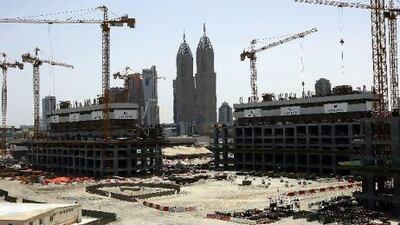Dubai Pearl, the US$3.8 billion (Dh13.95bn) development near the entrance of the Palm Jumeirah, has lost one of its largest investors and construction activity has been scaled back.
Dubai International Financial Centre (DIFC) Investments, the commercial arm of the financial free zone, pledged Dh3bn to buy 29 floors of the east tower of Dubai Pearl in late 2008. The deal was one of the last major announcements in the peak of the property boom that year.
But DIFC Investments paid only $13.6 million to Dubai Pearl. Shahli Akram, the chief executive of DIFC Investments, said this week the company had "no further commitment beyond the $13m invested in the project".
The challenges faced by Dubai Pearl are typical of the kind of problems that have led to a sharp decline in building activity across the emirate. Developers are still struggling to find funds to complete buildings that were stalled after the property downturn hit in late 2008.
Mr Akram took the helm of the company as part of a shake-up at the financial centre and has been trying to reduce its debts and sell assets.
His predecessor, Bisher Barazi, was blamed in court documents for completing the deal without proper due diligence. Mr Barazi has denied the allegation.
DIFC Investments reported losses of $247.7m last year compared with a loss of $561.4m in 2009. It has debts of about $3bn.
A spokesman for Dubai Pearl said DIFC Investments still had "an outstanding legal agreement" to buy property in the project, but that it was "in ongoing discussions with DIFCI to review and potentially look at restructuring the original agreement but these have not concluded".
Dubai Pearl had taken the money owed under the contract off its books more than two years ago and it "does not form part of Dubai Pearl's investment strategy moving forward", the spokesman said, adding it had Dh1bn of investment committed to the project so far from investors such as the Al Fahim Group of Abu Dhabi.
With tens of thousands of new homes and offices coming online this year across Dubai, the market has been under pressure and could fall even further, analysts say.
Office space is particularly oversupplied, with Jones Lang LaSalle predicting a 50 per cent vacancy rate by the end of this year.
Fadi Moussalli, the regional director of the international capital group at Jones Lang LaSalle, said there was limited appetite for investors to finance property projects in the emirate.
"If you are an investor and you want to put money into a project, that means you are calling the bottom of the market or you think that it is very close," Mr Moussalli said.
"From what I have observed, unless there are very special situations where a tenant is lined up and waiting for the property to be completed, or a distressed seller, I don't think there is any appetite."
Construction on the Dubai Pearl appeared to be revived in the first half of last year, about the time the company began a roadshow in Asia to seek out new investors. A spokesman said this week it had some success on the roadshow, but declined to give details.
A visit to the site on Tuesday found only a smattering of workers and little progress, compared with a few months earlier. The company said handover of phase one of the project, which could be worth as much as $6bn in sales value when it is completed, was on schedule and "programmed to start at the end of 2013".
Dubai Pearl lists the Al Fahim Group as an investor in the project, but it was unclear how much the family conglomerate was contributing to the project.
Al Fahim and other individuals and companies are listed as holders of $73.5m worth of shares in Dubai Pearl Holdings in the DIFC, which is the parent company of Pearl Dubai FZE, the builder of the project.
Al Fahim Group owns large properties across Dubai and Abu Dhabi, such as the Hilton Corniche Hotel Apartments and Fairmont Bab Al Bahr in Abu Dhabi.
It also has investments in other properties through Emirates Property Investment Company, a subsidiary.
bhope@thenational.ae

Key investor pulls out of $3.8bn Dubai Pearl
One of Dubai's largest property developments, located near the Palm Jumeirah, has lost a crucial early shareholder and has slowed down construction.
Most popular today
